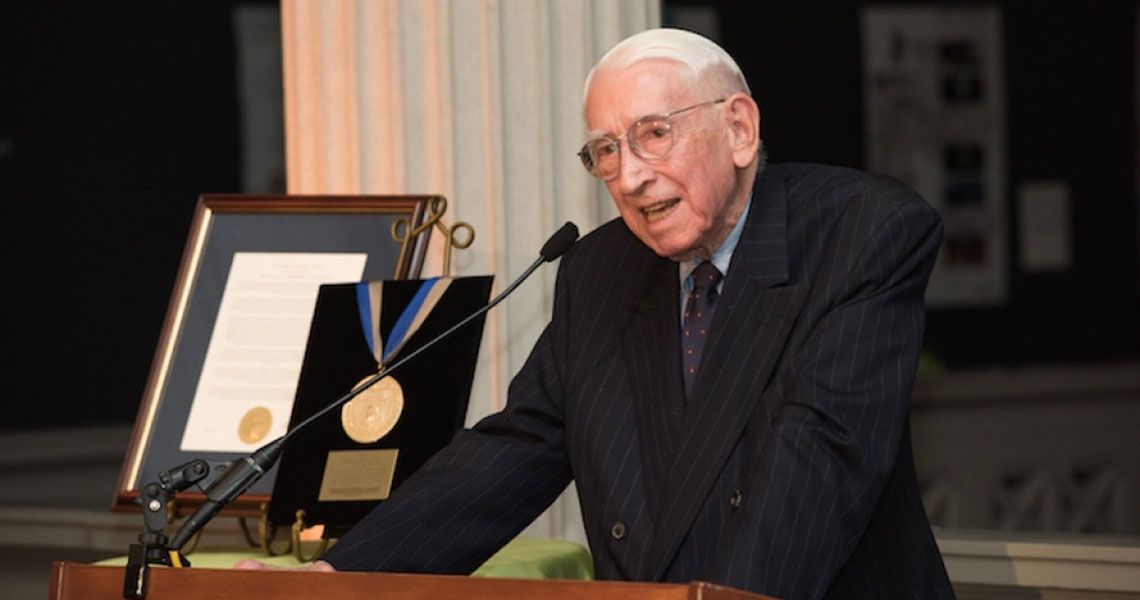Luther W. Brady, pictured at a ceremony in May 2015 when he received the university President's Medal.
Luther W. Brady, a George Washington University triple alumnus, trustee emeritus, world-renowned radiation oncologist and passionate advocate for the arts, died Friday. He was 92.
A longtime GW volunteer and donor, Dr. Brady, A.A. ’44, B.A. ’46, M.D. ’48, remained actively involved in his alma mater during his life, including as a member of the Board of Trustees and through his support of the School of Medicine and Health Sciences and the Luther W. Brady Art Gallery.
Dr. Brady most recently was a trustee emeritus—and, after more than two decades of service, was often still spotted seated alongside his colleagues at the board table on campus several times a year.
“Luther was one of the finest people in the world,” Board of Trustees Chair Nelson Carbonell said. “After every board meeting, he would send me a kind note of appreciation. He was always very positive and proud of the accomplishments of the university. Over the years, I had come to rely on his counsel and wisdom. He will be greatly missed by me and the entire GW community.”
President Thomas LeBlanc agreed.
“Dr. Brady’s contributions to GW are many and varied, stretching through several decades to help this university become what it is today,” Dr. LeBlanc said. “We are forever indebted to him, especially for his strong support of medicine and the arts.”
Beyond GW, Dr. Brady had a transformative impact on medicine and will be remembered as one of the world’s foremost radiation oncologists. In particular, Dr. Brady was instrumental in the initiation and establishment of modern radio-oncological treatments for eye tumors and cervical cancer, for which he established new standards of care.
His career of teaching and clinical excellence spanned more than 50 years at Hahnemann University School of Medicine and continued at Drexel University College of Medicine in Philadelphia. Dr. Brady is known and admired by thousands for his dual roles as educator and physician, teacher and caregiver.
“He was a pioneer and internationally recognized leader in the field of radiation oncology and cancer treatment,” said Jeffrey Akman, vice president for health affairs and dean of SMHS.
In addition to his board service at GW, Dr. Brady provided for the establishment of a named professorship in radiation oncology at SMHS. He is one of SMHS’ “most distinguished and celebrated alumni,” Dr. Akman said.
“Luther was a dear friend, advisor and inspiration to many of us at GW and his extraordinary contributions to GW, to medicine and to the arts cannot be overstated,” he added. “He leaves a tremendous legacy of compassion, service and achievement.”
Dr. Brady’s interest in the arts—formed during his service in the Navy—provided a counterbalance to his time spent in labs, clinics and classrooms. The university and many others benefited as a result.
Dr. Brady’s support of the Luther W. Brady Art Gallery helped it to grow and attract internationally recognized artists, such as Sean Scully, Howard Hodgkin, John Hubbard and Michael Craig-Martin. Dr. Brady supported talented emerging artists, built productive bridges between arts institutions, provided able leadership to many museum boards and contributed philanthropic support to a wide variety of beneficiaries. These ranged from the National Gallery of Art to the Opera Company of New Mexico to the Philadelphia Museum of Art, as well as the George Washington University Museum and The Textile Museum, of which Dr. Brady served as a member of the Board of Directors.
Dr. Brady has been and will continue to be the “guiding light” for the Luther W. Brady Art Gallery's collections and exhibitions, said Lenore D. Miller, director and chief curator of university galleries.
“His gifts to the university will be enjoyed by generations of George Washington University community and wider Washington, D.C., art community members,” Ms. Miller said. “Knowing Luther as a mentor in my professional and personal life for the past 15 years has been an unforgettable and thrilling experience.”
Among Dr. Brady’s lifetime of accolades and awards are the American Medical Association's Distinguished Service Award Gold Medal and the Strittmatter Award, granted by the Philadelphia County Medical Society. Dr. Brady also is a recipient of the GW Distinguished Alumni Achievement Award, the GW Society Medal, an honorary Doctor of Fine Arts degree from the university and the President’s Medal, the highest honor the university president can bestow in recognition of an awardee’s courage, character and leadership.
Receiving that President’s Medal at an event in his honor in 2015, Dr. Brady recalled with remarkable clarity and his trademark humor the minute details of the GW he arrived at, after having left his native North Carolina as a “wet-behind-the-ears 16 year old,” in fall 1942—the professor, the packed Lisner Auditorium, the “salacious” lectures.
Also on display that day in May was a humility that many would recognize.
He was “pleased and delighted” to receive the President’s Medal, he told attendees.
The man who had, deservedly, collected a lifetime of appreciation and admiration from those he touched wanted only to share his thanks with others: “I’m deeply grateful to everyone who’s made it possible.”



